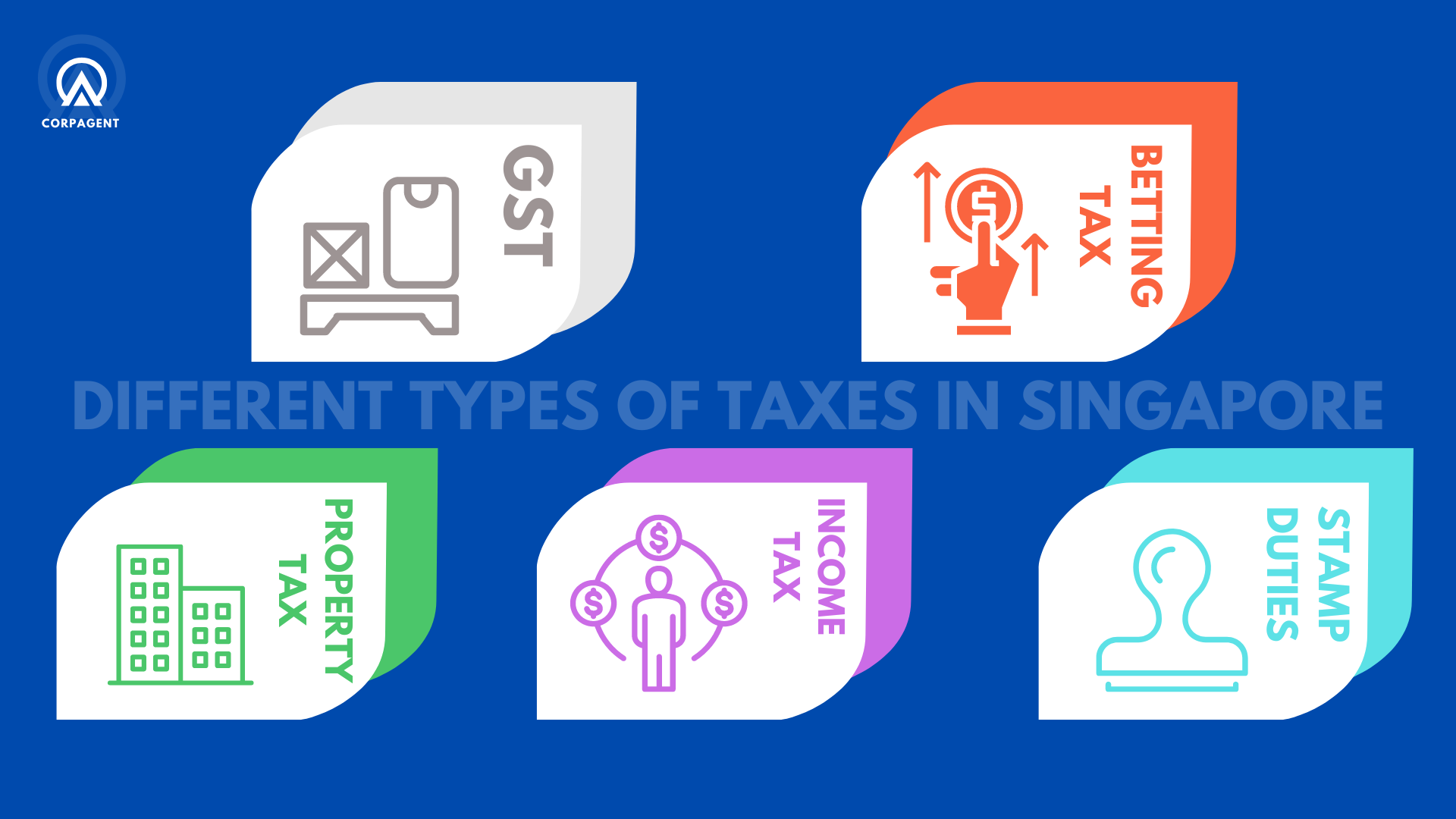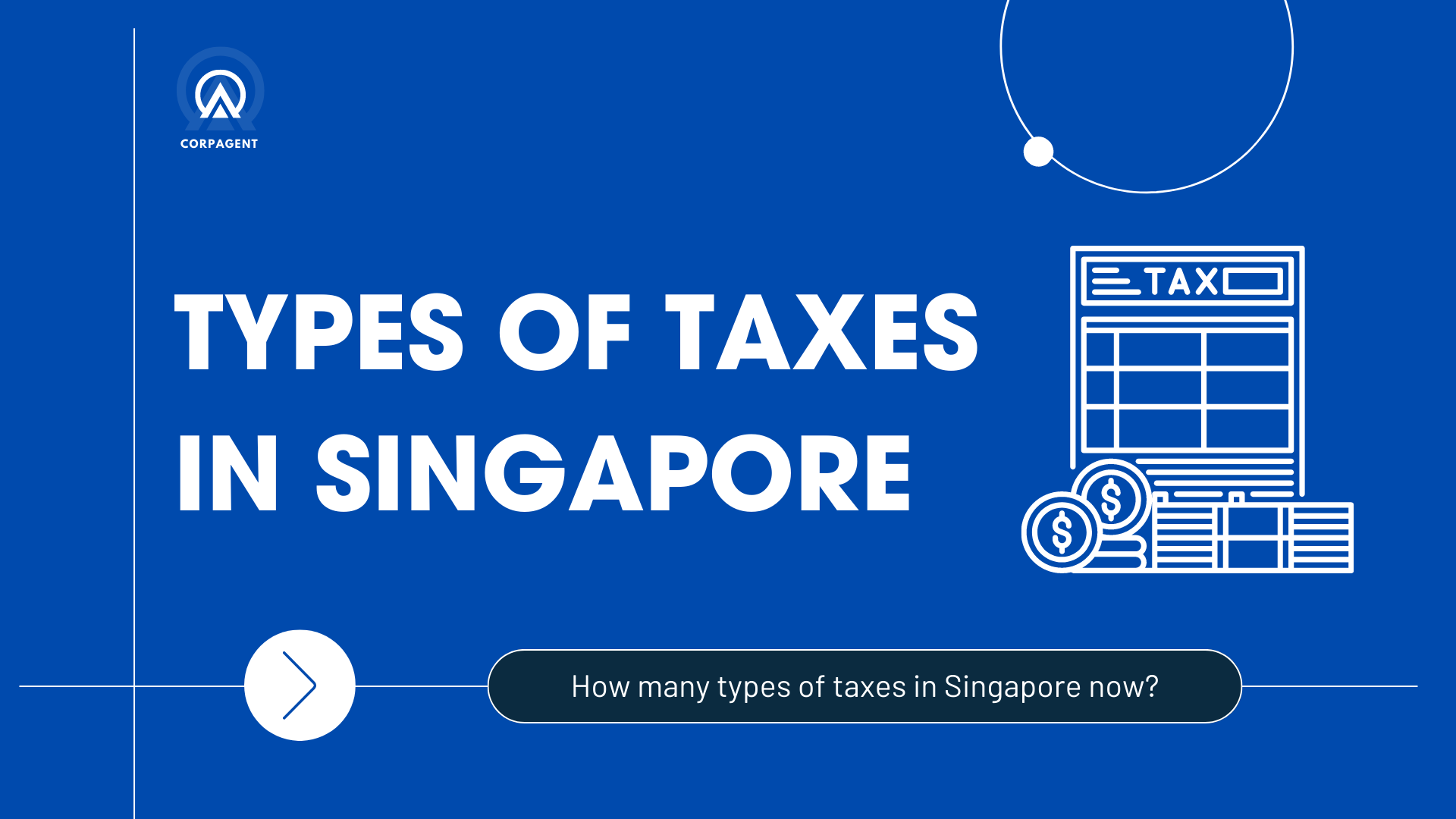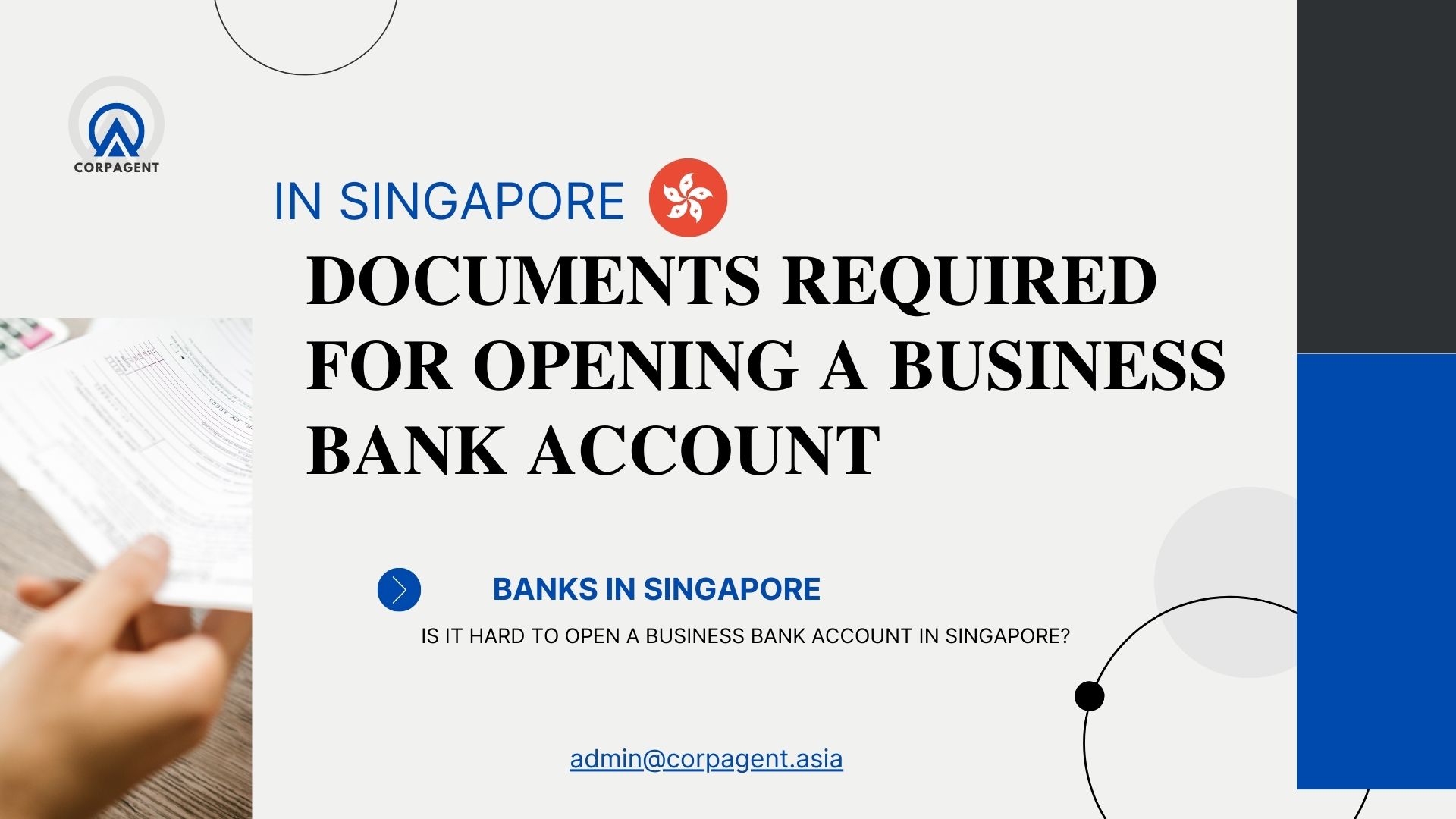Different Types of Taxes in Singapore (2023 update)
15-02-2023
Singapore attracts investors for a variety of reasons. The simplicity of establishing and maintaining enterprises is a major driver. Another important factor is Singapore’s tax code, which is well-known for its advantageous corporate and personal tax rates, tax relief programs, lack of capital gains tax, one-tier tax structure, and extensive double tax treaties.
See What Makes Singapore’s Reputation As A Startup Paradise here: https://corpagent.asia/what-makes-singapores-reputation-as-a-startup-paradise/
Persons carrying on any trade, profession, or business in Singapore, including corporations, partnerships, trustees, and bodies of persons, are subject to taxation on all profits (excluding profits from the sale of capital assets) arising in or derived from Singapore, as well as certain foreign-sourced income from such trade, profession, or business. In this article, we will show you different types of taxes in Singapore in order to help you start a business there.
Taxes in Singapore?
Singapore is a tiny island nation with world-class infrastructure and prominent luxury and entertainment icons. Singapore, being a melting pot of many cultures, is no surprise to many outsiders. Aside from enjoyment and luxury, Singapore is noted for its strong business and financial presence.
It is still one of the world’s most business- and tax-friendly countries. Its taxation structure is often regarded as one of the most competitive in the world. It’s no surprise that enterprises are eager to relocate their operations to Singapore.
Taxation is used to make Singapore a stronger community, a healthier environment, and a more dynamic economy, a place Singaporeans can be proud to call home.
Types of Taxes in Singapore
Corporate tax
Singapore’s corporate income tax is territorial, which means that only income received or sourced in Singapore is taxed. Companies must file an income tax return for earnings received in or generated from Singapore. In contrast to other nations, such as the United States, money earned in other countries is not taxed. Companies are taxed at a fixed rate of 17% on their taxable income. You may get assistance from any expert accounting company in comprehending Singapore’s corporate income tax. Here are some pointers to help international company owners pick the best accounting firm in Singapore:
Singapore charges a CIT at a flat rate of 17%, the lowest among ASEAN member countries. The country has a single-tier corporate tax structure, which implies that enterprises pay CIT only on chargeable income (profits), and all dividends are tax-free. If you are a new business, you can take advantage of corporation tax breaks for the first three years, paying 75% of the first $100,000 of chargeable income and just 50% of the tax on the following $200,000 of chargeable revenue.
Singapore also offers industry and sector-specific tax systems that cut tax rates and grant particular tax exemptions. Banking, shipping, leasing, and investment management are examples of these businesses. These techniques frequently cut the company’s effective tax rate to less than 17%.
Goods and Services Tax
The Goods and Services Tax (GST) was introduced in 1994 to strengthen the resilience of taxes as a source of government revenue. The current rate of GST is 7%. The balanced mix of consumption and income taxes decreases revenue intake’s sensitivity to changes in economic conditions and increases Singapore’s fiscal position’s resilience.
Singapore Goods and Services Tax is also quite comparable to other nations’ VAT or Value Added Tax. The Singapore government has not modified the Goods and Services Tax rate, according to the 2014 Budget, because of how well it has worked and how well it has kept businesses and their consumers pleased. Goods and Services Tax registration is divided into two categories: mandatory and optional. If your company satisfies specific criteria, it may be excused from registering for Goods and Services Tax. If a permanent establishment is not required to register for GST, it may be advantageous to do so voluntarily.
When consumers pay Goods and Services Tax on everything they buy, lower individual tax rates become more sustainable in the long term. In other words, GST may assist firms in saving money. Individuals and company owners seeking further tax breaks from the Singaporean government must apply for a Certificate of Residency in Singapore.
Withholding Tax
If your company employs Singapore non-residents as employees and foreign agents, or if your business partners are Singapore non-residents, they must pay withholding tax.
This is paid to the Singapore Inland Revenue Authority (IRAS). This withholding tax will apply to foreign, off-shore, and non-resident partners and employees’ commissions and fees. The rate of withholding tax varies based on the kind of payment.
Property Tax
All properties in Singapore are subject to property tax. HDB apartments, warehouses, factories, offices, and even vacant lots are all included. This is given out yearly on or before January 31st at a tax rate of 10%. This fee can be decreased if you fulfill the owner-occupier requirements.
Property owners, like individuals, can benefit from various rebates and tax refunds to make taxes affordable. For example, if your property has been empty for at least a month owing to maintenance work or a lack of renters, you may be able to decrease your property tax.
Stamp Duty
When it comes to purchasing property in Singapore, there are additional charges. Stamp Duty is one of them. Stamp Duty is simply the tax on papers related to the leasing or purchase of real estate. This will be paid to the IRAS.
Stamp duty applies to all residential property transactions, whether buying, selling, or renting, with a few exceptions. Stamp Duty can be rather expensive, so keep this in mind while planning your budget. You may use this calculator to determine how much you must pay.
Income Tax
- For Limited Liability Partnership: A Singapore LLP, by definition, is a corporate form that needs two or more partners. Partners must be at least 18 years old and resident in Singapore, or they must be a body corporate of another business or LLP.
- For Sole Proprietors and Partnerships: If you conduct your business as a sole proprietorship or as a partnership, your business revenue is included in your personal income. As a result, personal income tax rates will apply. When a consumer pays you for a Singapore product or when you receive money in Singapore from international sales, income tax rates apply. This income tax applies to every individual or corporation who earns money in Singapore. This includes your wages, companies, interest on various deposits, and other sources of taxable income.

Conclusion
Singapore’s tax system is an excellent illustration of how tax incentives may be efficiently used to encourage free trade and commercial activity while ensuring that the state collects enough income to achieve both economic and social objectives. This enabled the country to foster an atmosphere in which the state and its inhabitants benefit from one another.
Because of their streamlined tax rules, they have one of the greatest rates of tax compliance among domiciled residents and enterprises in the world. This symbiotic relationship has allowed the country to construct world-class infrastructure, improving the quality of life for its citizens and tempting global firms to migrate to Singapore.
CorpAgent is also a long-time provider of corporate services including payment gateway setup and underwriting. Send us an inquiry to admin@corpagent.asia, or contact us here.
Related content about Taxes
Company Formation in Singapore
Other News
Singapore VS Hong Kong : Where is the best place to do business 2023?
Singapore and Hong Kong have been vying for dominance as Asia’s ‘Best Place to Do Business’ for decades. Both regions have enticed international investors with tax-friendly regulations, simple firm incorporation procedures, and superb infrastructure, among other things. Although Hong Kong has a longer history as a corporate center, Singapore has quickly caught up, eroding Hong Kong’s supremacy in the area. Singapore has been fast to implement business-friendly regulations that have attracted the majority of global companies to build their Asian presence on its shores.
What documents are required for opening a business bank account in Singapore 2023?
When you’re ready to start taking or spending money as your business, open a business account. A business bank account keeps you legally compliant and safe. It also has advantages for your customers and workers.
Today, we’ll look at Singapore’s banking business, which is a sophisticated financial ecosystem of local and foreign institutions. You will learn about the procedures for creating a corporate bank account, the required documentation, and the variety of banking services. And if you’re interested in opening a business bank account in Singpore, we’ll provide you with consultancy to help you, please contact us through https://corpagent.asia/
RISKS & TIPS FOR OPENING A BANK ACCOUNT FOR START-UPS IN HONG KONG
The difficulty of obtaining commercial bank accounts in Hong Kong has been well – recognized in recent years. It is also really complicated. Despite media attention and pressure from the Hong Kong Monetary Authority, InvestHK, Chambers of Commerce, and Hong Kong business organizations, opening bank accounts remains difficult for start-ups and small and medium-sized firms in particular.

Top 3 Crypto Exchanges Singapore 2023
Singapore is a prominent financial center that has experienced an increase in cryptocurrency use. Investors are seeking for the finest crypto exchange in Singapore, with up to 93% of its population having moderate knowledge of the crypto business.
This article will guide you some newest and safest pros and cons, provided base on top reviewers of top 3 crypto exchanges in Singapore:








